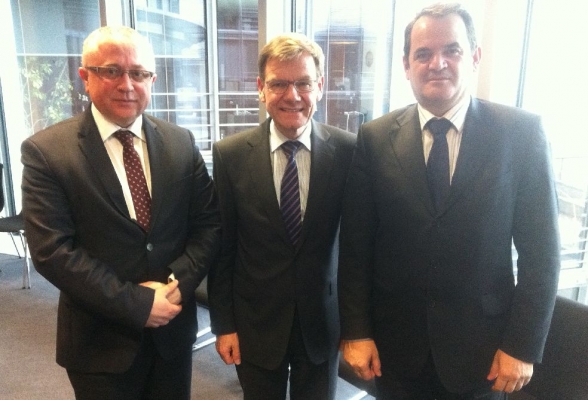They spoke with Admiral Torsten Koehler at the Ministry of Defence of Germany, and exchanged views on the current political and security situation in the Balkans, NATO’s role, as well as possible consequences of the crisis in Ukraine in relations with Russia. Montenegrin delegation expressed its appreciation for the assistance of the German Ministry of Defence in the education and training of the members of the Army of Montenegro, and for the support in the joint ISAF mission in Afghanistan.
In the Federal Academy for Security Policy, the delegation from Montenegro got acquainted with the work of this institution, as well as with the policy of the German Government on the issues of common European defense and security.
In an interview with Mr Christoph Israng, head of reports for the Balkans in the office of German Chancellor, Ms Angela Merkel, views were exchanged on the progress of Montenegro towards EU and NATO integration. Mr Israng said that Germany wanted to continue to pursue an active policy towards the countries of the Balkan region and that their government supported Montenegro's membership in the EU and NATO. Mr Mustafić and Mr Banović appreciated the support of Germany to reform processes in Montenegro, as well as its partnership relation that strengthened the stability and democratization of society.
Mr Hans Ulrich Sudbeck from the Ministry of Foreign Affairs of Germany, in charge of the Western Balkans, met with the Montenegrin delegation, and he pointed out that Montenegro had made rapid integration progress, proved the effectiveness of the decision-making process, but that it was very important to monitor the implementation of laws, particularly in the fight against crime and corruption.
Mr Mustafić and Mr Banović had separate meetings with members of Bundestag: Mr Roderich Kiesewetter, Mr Thorsten Frei and Mr Johann Wadephul, as well as with Mr Hans-Joachim Falenski, foreign policy adviser of the ruling party - CDU. Views on political and security situation were exchanged, especially in the context of the Ukrainian crisis. They also discussed the activities in the field of adoption of a set of electoral legislation and welcomed the progress made by the Parliament of Montenegro has made in this field. Bundestag members have expressed particular interest in the society reforms, strengthening of state institutions, stressed the need to strengthen media freedom and reduce the political pressure on the media, as well as to strengthen self-regulation and accountability in the media.
Mr Mustafić and Mr Banović emphasized the importance of support of the Bundestag to the democratization and strengthening of the capacity of institutions in Montenegro, and to the commitment to reforms and speeding up the process of joining the EU and NATO. They pointed out that it was important to strengthen the institutions of the state of law, protect journalist freedom, strengthen professionalism in the media and create an environment of full legal certainty, and to take decisive measures to combat crime and corruption. Mr Mustafić and Mr Banović expressed expectations that Montenegro would be supported in the acceleration of European integration and efforts to receive an invitation for membership in the NATO alliance.
As part of the visit to Berlin, Vice-president Mustafić and Mr Banović were received by Mr Frank Pris and Mr Patrik Keler, security and foreign policy coordinators in Konrad Adenauer Fondation, that organized the visit to German Government institutions and Bundestag, in order to be familiarized with German policy in the field of international relations and security.








